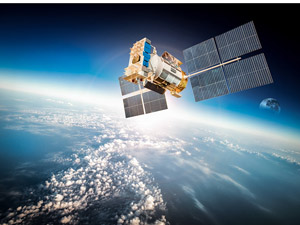



Date:10/08/17
 Chinese scientists have become the first to realize quantum key distribution from a satellite to the ground, laying the foundation for building a hack-proof global quantum communication network.
Chinese scientists have become the first to realize quantum key distribution from a satellite to the ground, laying the foundation for building a hack-proof global quantum communication network.
The achievement based on experiments conducted with the world's first quantum satellite, Quantum Experiments at Space Scale (QUESS), was published in the authoritative academic journal Nature on Thursday.
The Nature reviewers commented that the experiment was an impressive achievement, and constituted a milestone in the field.
Nicknamed "Micius" after a 5th century B.C. Chinese philosopher and scientist who is credited as the first person ever to conduct optical experiments, the 600-kilogram-plus satellite was sent into a sun-synchronous orbit at an altitude of 500 km on Aug. 16, 2016.
Pan Jianwei, lead scientist of QUESS and an academician of the Chinese Academy of Sciences (CAS), said the satellite sent quantum keys to ground stations in Xinglong, in north China's Hebei Province, and Nanshan near Urumqi, capital of northwest China's Xinjiang Uygur Autonomous Region.
Communication distance between the satellite and the ground stations varied from 645 km to 1,200 km, and the quantum key transmission rate from satellite to ground is up to 20 orders of magnitude more efficient than that expected using an optical fiber of the same length, said Pan.
When the satellite flies over China, it provides an experiment window of about 10 minutes. During that time, 300 kbit secure keys can be generated and sent by the satellite, according to Pan.
"That, for instance, can meet the demand of making an absolute safe phone call or transmitting a large amount of bank data," Pan said.
"Satellite-based quantum key distribution can be linked to metropolitan quantum networks where fibers are sufficient and convenient to connect numerous users within a city over 100 km. We can thus envision a space-ground integrated quantum network, enabling quantum cryptography - most likely the first commercial application of quantum information - useful at a global scale," Pan said.
The establishment of a reliable and efficient space-to-ground link for faithful quantum state transmission paves the way to global-scale quantum networks, he added.
Satellite sends unbreakable cipher from space
 Chinese scientists have become the first to realize quantum key distribution from a satellite to the ground, laying the foundation for building a hack-proof global quantum communication network.
Chinese scientists have become the first to realize quantum key distribution from a satellite to the ground, laying the foundation for building a hack-proof global quantum communication network.The achievement based on experiments conducted with the world's first quantum satellite, Quantum Experiments at Space Scale (QUESS), was published in the authoritative academic journal Nature on Thursday.
The Nature reviewers commented that the experiment was an impressive achievement, and constituted a milestone in the field.
Nicknamed "Micius" after a 5th century B.C. Chinese philosopher and scientist who is credited as the first person ever to conduct optical experiments, the 600-kilogram-plus satellite was sent into a sun-synchronous orbit at an altitude of 500 km on Aug. 16, 2016.
Pan Jianwei, lead scientist of QUESS and an academician of the Chinese Academy of Sciences (CAS), said the satellite sent quantum keys to ground stations in Xinglong, in north China's Hebei Province, and Nanshan near Urumqi, capital of northwest China's Xinjiang Uygur Autonomous Region.
Communication distance between the satellite and the ground stations varied from 645 km to 1,200 km, and the quantum key transmission rate from satellite to ground is up to 20 orders of magnitude more efficient than that expected using an optical fiber of the same length, said Pan.
When the satellite flies over China, it provides an experiment window of about 10 minutes. During that time, 300 kbit secure keys can be generated and sent by the satellite, according to Pan.
"That, for instance, can meet the demand of making an absolute safe phone call or transmitting a large amount of bank data," Pan said.
"Satellite-based quantum key distribution can be linked to metropolitan quantum networks where fibers are sufficient and convenient to connect numerous users within a city over 100 km. We can thus envision a space-ground integrated quantum network, enabling quantum cryptography - most likely the first commercial application of quantum information - useful at a global scale," Pan said.
The establishment of a reliable and efficient space-to-ground link for faithful quantum state transmission paves the way to global-scale quantum networks, he added.
Views: 458
©ictnews.az. All rights reserved.Similar news
- Mobile operators of national market to reduce roaming tariffs
- Iran vows to unplug Internet
- China Targeting Telecoms in Corruption Probe
- Bangladesh to use electronic voting system for next elections
- Philippine IT sector to launch five-year digital strategy plan
- Russian Premier Vladimir Putin meets ITU Secretary-General Hamadoun Touré
- US lawmakers propose to regulate use of geolocation data
- Unlimited mobile data plans dying as telcos gear up for cloud future
- Europe at risk of falling behind US and Asia on 4G use
- Netherlands first to regulate on net neutrality
- Korean Co Takes Aim At Display Patents
- Regulators, Banks Look for IT Hires After Breakdowns
- Electron transactions spreading
- Schools in remote rural areas will connect to the single database via network without SIM
- Obama to Personally Tweet From Twitter Account





















